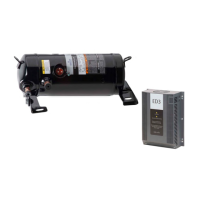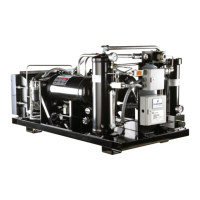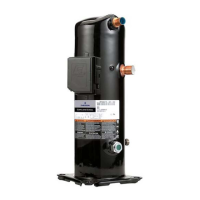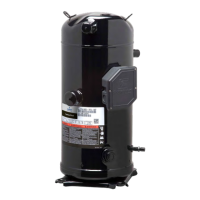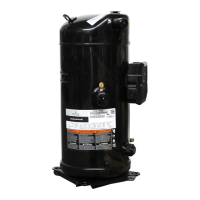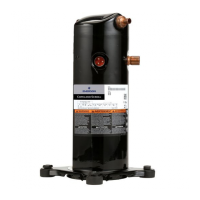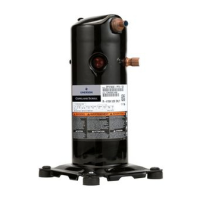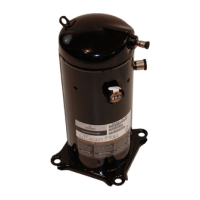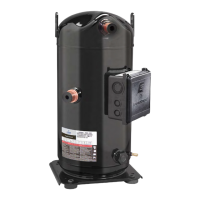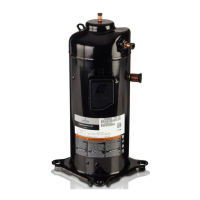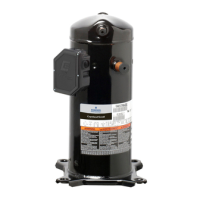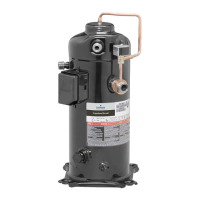Do you have a question about the Emerson Copeland Scroll YHV 2P Series and is the answer not in the manual?
Explains symbols used for warnings and cautions in the document.
Lists essential safety rules and personnel qualifications for handling equipment.
Provides general guidance on safe practices, including PPE and handling precautions.
Introduces the Scroll compressors, their development, and applications.
Details benefits of variable speed technology for efficiency and comfort.
Explains the coding system for compressor and drive model designations.
Covers key factors for applying compressors, including refrigerants, oil, and operating limits.
Describes the DLT control mode for managing discharge gas temperature.
Highlights key design elements enhancing compressor efficiency and reliability.
Discusses methods and considerations for effective oil return in the system.
Presents external dimensions and mounting details for compressor models.
Covers safe procedures for moving, storing, positioning, securing, and mounting compressors and drives.
Outlines safe and effective methods for brazing compressor connections.
Explains the function and selection criteria for suction line accumulators.
Warns against using fine mesh screens that can cause blockages.
Discusses the use and placement of mufflers for sound attenuation.
Notes availability and considerations for sound attenuation shells.
Advises on selection of insulation material, considering electrostatic charge.
Explains the benefits of variable speed during defrost and valve sizing.
Guides on managing piping design to minimize sound and vibration transmission.
Covers essential safety and connection guidelines for electrical systems.
Details safe practices for wiring, terminal boxes, and ground connections.
Provides circuit diagrams for single-phase and three-phase matched pairs.
Describes the motor type, connection, and insulation class.
Specifies requirements for fuses and other protection devices.
Explains the ED3 drive's integrated crankcase heating feature.
Details the installation and function of high- and low-pressure protection systems.
Emphasizes the need for external discharge gas temperature protection.
Outlines safety precautions for high-potential testing of compressors.
Covers procedures for system strength and tightness testing.
Lists essential checks before starting up the system.
Details safe and correct methods for charging the system with refrigerant.
Explains the importance of run-in period for performance and durability.
Provides critical steps and warnings for the first compressor start-up.
Describes the drive's soft start and controlled stop capabilities.
Warns against operating compressors in deep vacuum due to potential damage.
Explains risks of liquid refrigerant and oil dilution, and how to monitor.
Details the importance of minimum run time for oil return and compressor longevity.
Addresses oil level evaluation and the absence of a sight glass on YHV*2P models.
Stresses the need for trained personnel for maintenance and repair tasks.
Outlines procedures for safe preparation and execution of maintenance.
Provides steps for safely taking apart system components.
Details legal requirements for system tightness inspection and record-keeping.
Guides on safe handling and replacement of A2L refrigerants.
Covers procedures and considerations for replacing a compressor, including oil management.
Discusses proper handling and disposal of compressor oil.
Advises against the use of oil additives due to potential risks.
Lists causes and corrective actions for compressors that do not run or buzz.
Addresses issues where the compressor shows no activity or sound.
Explains causes and solutions for motor protection trips.
Discusses causes and remedies for high discharge temperatures.
Covers reasons for continuous compressor operation and potential fixes.
Identifies issues related to oil return and lubrication.
Addresses causes and solutions for low discharge pressure.
Explains issues leading to low suction pressure and their fixes.
Mentions noise during shut-off and its lack of impact on durability.
Provides guidelines for environmentally responsible removal and disposal of oil and refrigerant.
Specifies disposal procedures for compressors and drives per regulations.
Lists other relevant documents and manuals for further details.
Points to resources for product select software and technical data.
Directs users to find spare parts and accessories information.
| Series | YHV 2P |
|---|---|
| Manufacturer | Emerson Copeland |
| Type | Scroll |
| Application | Air Conditioning |
| Refrigerant | R410A |
